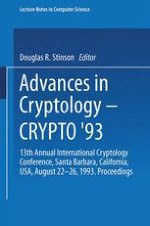1994 | OriginalPaper | Buchkapitel
A new identification scheme based on syndrome decoding
verfasst von : Jacques Stern
Erschienen in: Advances in Cryptology — CRYPTO’ 93
Verlag: Springer Berlin Heidelberg
Enthalten in: Professional Book Archive
Aktivieren Sie unsere intelligente Suche, um passende Fachinhalte oder Patente zu finden.
Wählen Sie Textabschnitte aus um mit Künstlicher Intelligenz passenden Patente zu finden. powered by
Markieren Sie Textabschnitte, um KI-gestützt weitere passende Inhalte zu finden. powered by
Zero-knowledge proofs were introduced in 1985, in a paper by Goldwasser, Micali and Rackoff ([6]). Their practical significance was soon demonstrated in the work of Fiat and Shamir ([4]), who turned zero-knowledge proofs of quadratic residuosity into efficient means of establishing user identities. Still, as is almost always the case in public-key cryptography, the Fiat-Shamir scheme relied on arithmetic operations on large numbers. In 1989, there were two attempts to build identification protocols that only use simple operations (see [11,10]). One appeared in the EUROCRYPT proceedings and relies on the intractability of some coding problems, the other was presented at the CRYPTO rump session and depends on the so-called Permuted Kernel problem (PKP). Unfortunately, the first of the schemes was not really practical. In the present paper, we propose a new identification scheme, based on error-correcting codes, which is zero-knowledge and is of practical value. Furthermore, we describe several variants, including one which has an identity based character. The security of our scheme depends on the hardness of decoding a word of given syndrome w.r.t. some binary linear error-correcting code.
